December 2019: Olive Tree

Volume IV/Issue 9/December 2019


From The Editorial Desk
DO SOMETHING!
“Then standing in the gate of the camp, Moses said: If any man be on the Lord's side let him join with me. And all the sons of Levi gathered themselves together unto him.”
—Exodus 32:26.

Exodus 32 tells the sad story of the backsliding of the children of Israel while Moses was on the mount receiving the Ten Commandments from the Lord. Except for the intercession of Moses on behalf of the people, God would have destroyed all of them immediately.
Then read how Moses stood in the gate of the camp and called to all those on the Lord’s side to come to him and take their stand publicly. He then commanded those who did take a stand to buckle on their swords and go through the midst of the camp dealing in judgment on the Lord’s behalf.
The spiritual lesson for us is that in the times when men are departing from the Catholic faith, God needs others who will take a stand publicly along side a True Pope for Him. Surely that day is upon us! God is looking for people who will stand up for Him side by side with the true Pope and hold real convictions. This is certainly no time not to be all out for the Lord, taking a real stand for Christ.
I have heard the story of an incident in the Battle of Chattanooga during the War Between the States.
Two Confederate soldiers were stationed on top of Lookout Mountain where they could observe the battle going on below.
As the battle waged hot and heavy, they were dismayed to see a great host of Union Army reinforcements coming up to help in the battle. The two soldiers knew almost certainly it meant death for the now over whelmed Confederate forces below.
One of the men said, “Boy, I sure am for our men down there, aren’t you?” To which the other soldier replied, “I am not only for them, but in five minutes I am going to be with them!” and plunged down the hill to join the battle against the overwhelming forces.
The lesson is obvious. It is one thing to be for something, another thing to be joined in the battle.
Edmund Burke has said, “The only thing necessary for the triumph of evil is that good men do nothing.”
In spiritual matters as well as in the battle illustration, it is the person who does something about it that will actually help to win the victory.
There are many people today who are for having a Pope but never do any thing about it. Thousands of Catholics are against modernism in their Parishes, but they are afraid to stand for what is right. The great flood of compromise could be stemmed if those who are for the Catholic faith before the mess we ended up with for the last 50 years would really take a stand along side "Moses". So many are not willing to lose friends to stand up for their convictions. I do not spend a whole lot of time discussing the need for a Pope. Nor do I spend much time arguing for Pope Michael. But I will say that there is no one today, who says that they are Pope who has either gone through the right procedures to become Pope, or who is not in heresy. Don't believe me? Find out for yourself.
- https://www.amazon.com/Pope-Michael/e/B008N3NV5W/ref=as_li_ss_tl?ie=UTF8&linkCode=sl2&tag=popemich-20&linkId=57ff1b64cf6230b664591991617fd358
- https://www.scribd.com/user/3435195/David-Bawden
- https://www.vaticaninexile.com/frequently_asked_questions.php
- https://www.vaticaninexile.com/summary_of_the_position_of_pope_michael.php
In conclusion don’t just be for something; do something about it!

A Tale of the Three Trees

Once upon a mountain top, three little trees stood and dreamed of what they wanted to become when they grew up. The first little tree looked up at the stars and said: "I want to hold treasure. I want to be covered with gold and filled with precious stones. I'll be the most beautiful treasure chest in the world! "The second little tree looked out at the small stream trickling by on its way to the ocean. "I want to be traveling mighty waters and carrying powerful kings. I'll be the strongest ship in the world! "
The third little tree looked down into the valley below where busy men and women worked in a busy town. "I don't want to leave the mountain top at all. I want to grow so tall that when people stop to look at me, they'll raise their eyes to heaven and think of God. I will be the tallest tree in the world!"
Years passed. The rain came, the sun shone, and the little trees grew tall. One day three woodcutters climbed the mountain.
The first woodcutter looked at the first tree and said, "This tree is beautiful. It is perfect for me. With a swoop of his shining axe, the first tree fell. Now I shall be made into a beautiful chest. I shall hold wonderful treasure!", the first tree said.
The second woodcutter looked at the second tree and said, "This tree is strong. It is perfect for me." With a swoop of his shining axe, the second tree fell. "Now I shall sail mighty waters! thought the second tree. I shall be a strong ship for mighty kings!"
The third tree felt her heart sink when the last woodcutter looked her way. She stood straight and tall and pointed bravely to heaven. But the woodcutter never even looked up. Any kind of tree will do for me, he muttered. With a swoop of his shining axe, the third tree fell.
The first tree rejoiced when the woodcutter brought her to a carpenters shop. But the carpenter fashioned the tree into a feedbox for animals. The once beautiful tree was not covered with gold, nor with treasure. She was coated with sawdust and filled with hay for hungry farm animals.
The second tree smiled when the woodcutter took her to a shipyard, but no mighty sailing ship was made that day. Instead, the once strong tree was hammered and sawed into a simple fishing boat. She was too small and too weak to sail on an ocean, or even a river; instead, she was taken to a little lake.
The third tree was confused when the woodcutter cut her into strong beams and left her in a lumberyard. "What happened?", the once tall tree wondered. All I ever wanted was to stay on the mountain top and point to God.
Many, many days and night passed. The three trees nearly forgot their dreams.
But one night, golden starlight poured over the first tree as a young woman placed her newborn baby in the feed box. "I wish I could make a cradle for him", her husband whispered. The mother squeezed his hand and smiled as the starlight shone on the smooth and the sturdy wood. "This manger is beautiful", she said.
And suddenly the first tree knew he was holding the greatest treasure in the world.
One evening a tired traveler and his friends crowded into the old fishing boat. The traveler fell asleep as the second tree quietly sailed out into the lake. Soon a thundering and thrashing storm arose. The little tree shuddered. She knew she did not have the strength to carry so many passengers safely through with the wind and the rain. The tired man awakened. He stood up, stretched out his hand, and said, "Peace." The storm stopped as quickly as it had begun. And suddenly the second tree knew he was carrying the king of heaven and earth.
One Friday morning, the third tree was startled when her beams were yanked from the forgotten woodpile. She flinched as she was carried through an angry jeering crowd. She shuddered when soldiers nailed a mans hands to her. She felt ugly and harsh and cruel. But on Sunday morning, when the sun rose and the earth tremble with joy beneath her, the third tree knew that Gods love had changed everything. It had made the third tree strong. And every time people thought of the third tree, they would think of God. That was better than being the tallest tree in the world.
The next time you feel down because you aren't where you want to be in life, sit tight and be happy because God is thinking of something better for you.
Merry Christmas!
The True Christmas Gift
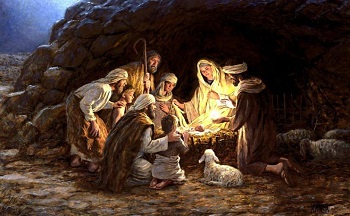
Did you ever order something or send away for something and the item finally arrived and you open it with great anticipation. And when you finally open the package and see what you ordered, you soon discover that the item does not match up with what you thought it would be. You were "under-whelmed," so to speak. "This is it?!?" "This is what I've been waiting for?!?" As we have spoken in the past, the faithful Jews were indeed praying for a Messiah to save them. They were anticipating the arrival of the Messiah. They knew that God would save them and they were waiting. But they had a preconceived notion of what the Messiah would look like. They expected the Messiah to arrive as a great warrior riding in on a powerful horse, surrounded by a mighty army in support with flags waving and banners raised. They expected this messiah and his army to wipe out their foes and save them from their misery. And yet the Lord Himself has said not to base our opinions on outward appearances: " . . . for the Lord seeth not as man seeth; for man looketh on the outward appearance, but the Lord looketh on the heart." (I Samuel :7) So often we judge solely on "outward appearances," don't we? And so often we are sorely disappointed, aren't we? The product we see advertised on television doesn't really match up when we see it in person.
And yet we know that the Messiah did indeed arrive as promised but Our Saviour arrived as an innocent little baby, born to a common family, born in a lowly manger on a cold winter night because nobody would take them in otherwise. In fact, the actual arrival itself was so "low-key" that hardly anyone knew about it at all except for the angels and a few shepherds. I mean let's be honest here. In regards to anticipating the arrival of the Messiah, I am sure that none of us would picture the Saviour of the world arriving as a small baby, born to an impoverished family, with nowhere else to stay other than in a place for animals. But, then again, if we look at a dying man hanging on a cross, if we didn't know any better, we wouldn't picture that as "victory," either. It would seem more like "defeat" than "victory." And yet we know through our faith that hope was born in that little manger at Bethlehem and we know that victory truly was earned on that Cross at Calvary. Sometimes, hope is deceiving to our physical eyes. Faith is something that we find with the heart and not solely what we see with our eyes. The important thing for us to always remember as people of faith that we have to look at hope through the eyes of faith if we really want to see how God is working in our lives. So, use this holy Season of Advent to look at things in a brand new way. Look at the world with the eyes of faith. St. Paul tells the Corinthians: "For we walk by Faith and not by sight." (II Corinthians 5:7)
So this Christmas, make a point to look at the gift of the Christ Child with eyes of faith. Realize that He surely is the greatest Gift God could ever have given us. God has given us the greatest Gift ever . . . He gave His Son to the world to save us from our sins.
The Funny Pharmacy
A joyful mind maketh age flourishing: a sorrowful spirit drieth up the bones. - Proverbs 17:22
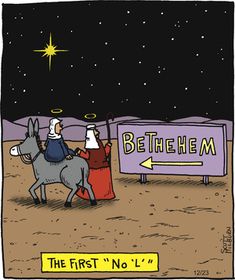



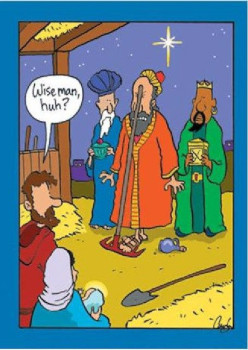


Is it your opinion that because of their acquiescence regarding John XXIII the Bishops, and in turn the clergy throughout the Church, therefore shared in the heresy as if a virus spread throughout the whole Church?
Actually they became schismatics for accepting a man as Pope, who indeed was not Pope.

The Pope Speaks: December 2019
Bring Forth Fruits Worthy of Repentance

Happy New Year. December 1, 2019 brings us to the beginning of the 2019-2020 Liturgical year with the holy season of Advent. Saint John the Baptist in the spirit of Elias told the people to bring forth fruits worthy of penance. (Matthew 3:8; Luke 3:8) The word translated as penance in the Douay-Rheims in other places is translated as repentance. How many of us connect penance with repentance?
Advent, Septuagesima and Lent are penitential seasons. As such, they serve as a preparation for the great feasts of the Nativity of our Lord and His Resurrection. And so, just what is a penitent? A penitent is anyone, who has committed one or more mortal sins and then repented of them. One priest about a century ago remarked that eighty-five percent of the saints were penitents, so we are in good company.
We are all called to be saints, and some of the saints said that in these times the greatest saints would live. If you are reading this, then God is calling you to be one of these saints. We cannot live a life of mediocrity, today calls for heroic sanctity. David lamented many centuries ago: "Save me, O Lord, for there is now no saint: truths are decayed from among the children of men." (Psalms 11:2) We also read this lament at the end of the day on many Feria 3 (Tuesday's) in the Office of Compline where this psalm is read.
God is calling us to reexamine ourselves this liturgical year. God is calling us to repentance of our sins, which calls us to heed advice Jesus gave on two occasions: "Go now and sin no more." (John 8:11; John 5:14) This Advent we have three and a half weeks before the Nativity of our Lord to complete our Christmas shopping. Jesus wants our whole heart, soul, mind, body and strength for His holy Birthday. Why are we still holding back? And yes, we are holding back. We need to examine our self carefully on this, because it is time to turn over a new leaf and become saints and stop holding back part of ourselves for our own pleasure and out of selfishness.
This is a two step process, conversion, which brings on repentance. Conversion is a complete change of customs and habits. Instead of living a worldly life, we begin living with one foot already in heaven. Saint Paul told the Romans (12:1-2): "I BESEECH you therefore, brethren, by the mercy of God, that you present your bodies a living sacrifice, holy, pleasing unto God, your reasonable service. And be not conformed to this world; but be reformed in the newness of your mind, that you may prove what is the good, and the acceptable, and the perfect will of God."
And so let us bring forth fruits worthy of repentance, beginning today.


Saint John Cassian
On The Eight Vices
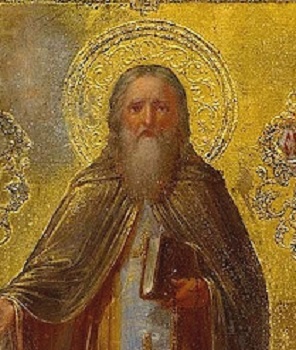
On the Demon of Unchastity and the Desire of the Flesh
Our second struggle is against the demon of unchastity and the desire of the flesh, a desire which begins to trouble man from the time of his youth. This harsh struggle has to be fought in both soul and body, and not simply in the soul, as is the case with other faults. We therefore have to fight it on two fronts.
Bodily fasting alone is not enough to bring about perfect self-restraint and true purity; it must be accompanied by contrition of heart, intense prayer to God, frequent meditation on the Scriptures, toil and manual labor. These are able to check the restless impulses of the soul and to recall it from its shameful fantasies. Humility of soul helps more than everything else, however, and without it no one can overcome unchastity or any other sin. In the first place, then, we must take the utmost care to guard the heart from base thoughts, for, according to the Lord, 'out of the heart proceed evil thoughts, murders, adulteries, unchastity' and so on (Matt. 15:19).
We are told to fast not only to mortify our body, but also to keep our intellect watchful, so that it will not be obscured because of the amount of food we have eaten and thus be unable to guard its thoughts. We must not therefore expend all our effort in bodily fasting; we must also give attention to our thoughts and to spiritual meditation, since otherwise we will not be able to advance to the heights of true purity and chastity. As our Lord has said, we should 'cleanse first the inside of the cup and plate, so that their outside may also be clean' (Matt. 23:26).
If we are really eager, as the Apostle puts it, to 'struggle lawfully' and to 'be crowned’ (2 Tim. 2:5) for overcoming the impure spirit of unchastity, we should not trust in our own strength arid ascetic practice, but in the help of our Master, God. No one ceases to be attacked by this demon until he truly believes that he will be healed and reach the heights of purity not through his own effort and labor, but through the aid and protection of God. For such a victory is beyond man's natural powers. Indeed, he who has trampled down the pleasures and provocations of the flesh is in a certain sense outside the body. Thus, no one can soar to this high and heavenly prize of holiness on his own wings and learn to imitate the angels, unless the grace of God leads him upwards from this earthly mire.
No virtue makes flesh-bound man so like a spiritual angel as does self-restraint, for it enables those still living on earth to become, as the Apostle says, 'citizens of heaven’ (cf. Phil. 3:20). A sign that we have acquired this virtue perfectly is that our soul ignores those images which the defiled fantasy produces during sleep; for even if the production of such images is not a sin, nevertheless it is a sign that the soul is ill and has not been freed from passion. We should therefore regard the defiled fantasies that arise in us during sleep as the proof of previous indolence and weakness still existing a us; since the emission which takes place while we are relaxed in sleep reveals the sickness that lies hidden in our souls. Because of this the Doctor of our souls has also placed the remedy in the hidden regions of the soul, recognizing that the cause of our sickness lies there when He says: 'Whoever looks at a woman with lust has already committed adultery with her in his heart' (Matt. 5:28). He seeks to correct not so much our inquisitive and unchaste eyes as the soul which has its seat within and makes bad use of the eyes which God gave it for good purposes. That is why the Book of Proverbs in its wisdom does not say: 'Guard your eyes with all diligence' but 'Guard your heart with all diligence' (Prov. 4:23), imposing the remedy of diligence in the first instance upon that which makes use of the eyes for whatever purpose it desires.
The way to keep guard over our heart is immediately to expel from the mind every demon-inspired recollection of women - even of mother or sister or any other devout woman - lest by dwelling on it for too long the mind is thrown headlong by the deceiver into debased and pernicious thoughts. The commandment given by God to the first man, Adam, told him to keep watch over the head of the serpent (cf. Gen. 3:15. LXX), that is, over the first inklings of the pernicious thoughts by means of which the serpent tries to creep into our souls. If we do not admit the serpent's head, which is the provocation of the thought, we will not admit the rest of its body - that is, the assent to the sensual pleasure which the thought suggests - and so debase the mind towards the illicit act itself.
As it is written, we should 'early in the morning destroy all the wicked of the earth' (Ps. 101:8), distinguishing in the light of divine knowledge' our sinful thoughts and then eradicating them completely from the earth - our hearts in accordance with the teaching of the Lord. While the-children of Babylon - by which I mean our wicked thoughts - are still young, we should dash them to the ground and crush them against the rock, which is Christ (cf. Ps. 137:9; 1 Cor. 16:4). If these thoughts grow stronger because we assent to them, we will not be able to overcome them without much pain and labor.
It is good to remember the sayings of the Fathers as well as the passages from Holy Scripture cited above. For example, Saint Basil, Bishop of Caesarea in Cappadocia, said; 'I have not known a woman and yet I am not a virgin.'
He recognized that the gift of virginity is achieved not so much by abstaining from intercourse with woman as by holiness and purity of soul, which in its turn is achieved through fear of God. The Fathers also say that we cannot fully acquire the virtue of purity unless we have first acquired real humility of heart. And we will not be granted true spiritual knowledge so long as the passion of unchastity lies hidden in the depths of our souls.
To bring this section of our treatise to a close, let us recall one of the Apostle's sayings which further illustrates his teaching on how to acquire self-restraint. He says; 'Pursue peace with all men and the holiness without which no one will see the Lord' (Heb. 12:14). It is clear that he is talking about self-restraint from what follows: 'Lest there be any unchaste or profane person, such as Esau' (Heb. 12:16). The more heavenly and angelic the degree of holiness, the heavier are the enemies' attacks to which it is subjected. We should therefore try to achieve not only bodily control, but also contrition of heart with frequent prayers of repentance, so that with the dew of the Holy Spirit we may extinguish the furnace of our flesh, kindled daily by the king of Babylon with the bellows of desire (cf. Dan. 3:19). In addition, a great weapon has been given us in the form of sacred vigils; for just as the watch we keep over our droughts by day brings us holiness at night, So vigil at night brings purity to the soul by day.

Saints from East and West
Saints whose feasts are celebrated this month
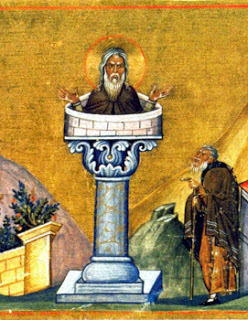
December 11 (Byzantine) - Saint Daniel the Stylite.
The Monk Daniel the Stylite (Pillar-Dweller) was born in the village of Bythar, near the city of Samosata in Mesopotamia.
His mother Martha was childless for a long while and in her prayers gave a vow, that if she had a child, she would dedicate him to the Lord. Her prayers were heard, and Martha soon gave birth to a son, who until he was five years of age was without a name. The parents of the boy desired, that since he was born through the good-will of God, he should likewise receive from God his name. They took their son to a monastery located nearby and approached the hegumen. The hegumen gave orders to take down one of the Divine-service books, and at random having unrolled it, found in it the mention of the Prophet Daniel. Thus did the lad receive his name. The parents asked that the lad might remain at the monastery, but the hegumen would not accept him, since he was still but a small boy. At twelve years of age, saying nothing to anyone, the lad left home for the monastery.
His parents were happy when they learned where their son was, and they went to the monastery. Seeing that he was still going about in his worldly clothes, they besought that the hegumen should attire him in the Angelic garb. And on that Sunday the hegumen fulfilled their request, but permitted them often to visit their son. The brethren of the monastery were astonished at the efforts of the monk.
One time on a visit to the monastery came Saint Simeon the Stylite, who foretold to the young monk that he too would undertake the feat of pillar-dwelling.
The Monk Daniel continued on with his ascetic life in seclusion. When in a vision the place of a new exploit was revealed to him, he withdrew into the Thracian wilderness together with two students, where they set up a pillar, upon which the Monk Daniel dwelt for 33 years. People thronged to the pillar, those who were misfortunate and those who were sick, and all received from the Monk Daniel help and healing. Byzantine emperors likewise besought the prayers of the holy ascetic. And from the numerous predictions of the monk, the most notable was about a strong conflagration in Constantinople. The Monk Daniel possessed also the gift of gracious words. He guided many onto the path of correcting their lives. The monk reposed in his eightieth year.
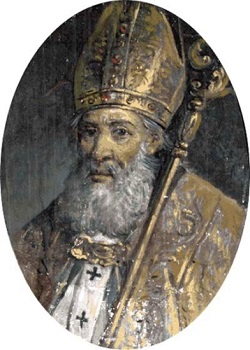
December 16 - Saint Eusebius of Vercelli.
Saint Eusebius was born in the isle of Sardinia, where his father is said to have died in chains for the faith. His mother, when left a widow, took him and a daughter, both in their infancy, to Rome, where Eusebius was brought up and ordained lector. He was called to Vercelli, in Piedmont, and served that church with such distinction that he was chosen to govern it by the clergy and people. He is the first bishop of Vercelli whose name we know. Saint Ambrose assures us that he was the first who in the West united the monastic discipline with the clerical, living himself with some of his clergy a common life in community. For this reason Saint Eusebius of Vercelli is specially venerated by the canons regular. He saw that the best and first means to labour effectually for the sanctification of his people was to form under his own eyes a clergy on whose virtue, piety and zeal he could depend. In this he succeeded so well that other churches demanded his disciples for their bishops, and a number of prelates came out of his school who were shining lamps in the Church of God. He was at the same time very careful personally to instruct his flock, and, moved by the force of the truth which he preached and persuaded by the sweetness and charity of his conduct, many sinners were encouraged to change their lives. But in 354 he was called to the public work of the Church at large, and for ten years following was a distinguished and persecuted confessor of the faith.
In that year Pope Liberius deputed Saint Eusebius, with Lucifer of Cagliari, to beg the Emperor Constantius to assemble a council to try and end the trouble between Catholics and Arians. Constantius agreed, and a council met at Milan in 355. Eusebius, seeing things would be carried by force through the power of the Arians, though the Catholic prelates were more numerous, refused to go to it till he was pressed by Constantius himself. When the bishops were called on to sign a condemnation of Saint Athanasius that had been drawn up, Eusebius refused, and instead laid the Nicene creed on the table and insisted on all signing that before the case of Saint Athanasius should be considered. Great tumult and confusion followed. Eventually the emperor sent for Saint Eusebius, Saint Dionysius of Milan and Lucifer of Cagliari, and pressed them to condemn Athanasius. They insisted upon his innocence and that he could not be condemned without being heard, and urged that secular force might not be used to influence ecclesiastical decisions. The emperor stormed and threatened to put them to death, but was content to banish them. The first place of exile of Saint Eusebius was Scythopolis (Beisan) in Palestine, where he was put in charge of the Arian bishop, Patrophilus.
He was lodged at first with Saint Joseph of Palestine (the only orthodox household in the town), and was comforted by the visits of Saint Epiphanius and others, and by the arrival of the deputies of his church of Vercelli with money for his subsistence. But his patience was to be exercised by great trials. Count Joseph died, and the Arians insulted the bishop, dragged him through the streets half naked, and shut him up in a little room, where he was pestered for four days with all manner of annoyances to make him conform. They forbade his deacons and other fellow confessors to be admitted to see him, so he sent a letter to Bishop Patrophilus addressed, "Eusebius, the servant of God, with the other servants of God who suffer with him for the faith, to Patrophilus the jailer, and to his officers." After a short account of what he had suffered, he asked that his deacons might be allowed to come to him. Eusebius undertook a sort of "hunger-strike," and after he had remained four days without food the Arians sent him back to his lodging. Three weeks afterwards they came again, broke into the house, and dragged him away. They rifled his goods, plundered his provisions, and drove away his attendants. Saint Eusebius found means to write a letter to his flock, in which he mentions these particulars. Later he was removed from Scythopolis into Cappadocia, and some time afterwards into the Upper Thebaid in Egypt. We have a letter which he wrote from this place to Gregory, Bishop of Elvira, praising him for his constancy against those who had forsaken the faith of the Church. The undaunted confessor expresses a desire to end his life in suffering for the kingdom of God.
When Constantius died towards the end of the year 361, Julian gave leave to the banished prelates to return to their sees, and Saint Eusebius came to Alexandria to concert measures with Saint Athanasius for applying proper remedies to the evils of the Church. He took part in a council there, and then went on to Antioch to put into effect the wish of the council that Saint Meletius should there be recognized as bishop and the Eustathian schism healed. But he found it widened by Lucifer of Cagliari, who had blown on the coals afresh by ordaining Paulinus bishop for the Eustathians. Eusebius remonstrated with him for this rash act; but the hasty Lucifer resented this, and broke off communion with him and with all who, with the Council of Alexandria, received the ex-Arian bishops. This was the origin of the schism of Lucifer, who by pride lost the fruit of his former zeal and sufferings.
Unable to do any good at Antioch, Saint Eusebius travelled over the East and through Illyricum, confirming in the faith those who were wavering and bringing back many that were gone astray. In Italy Saint Hilary of Poitiers and Saint Eusebius met, and were employed together in opposing the arianizing Auxentius of Milan. Vercelli, on the return of its bishop after so long an absence, "laid aside her garments of mourning," as Saint Jerome puts it, but of the last years of Saint Eusebius nothing is known. He died on August 1, on which day his eulogy occurs in the Roman Martyrology. He is therein referred to as a martyr, but the Breviary makes it clear that he was so by his sufferings and not by his death. In the cathedral of Vercelli is shown a manuscript copy of the gospels said to be written by Saint Eusebius: it was almost worn out with age nearly a thousand years ago when King Berengarius caused it to be covered with plates of silver. This manuscript is the earliest codex of the Old Latin version in existence. Saint Eusebius is among the several persons to whom the composition of the "Athanasian Creed" has been attributed.


Books to feed your faith!
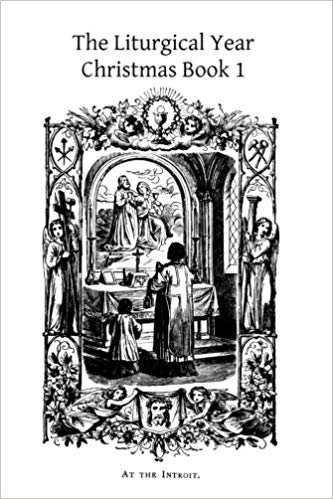
The Liturgical Year: Christmas Book 1 (Volume 1)
$19.95
One of a fifteen volume set, which is being brought back into print for the edification of the Faithful. Anyone who wishes to appreciate the timeless Tridentine Mass and liturgy will find this set a valuable aid in that endeavor. Dom Gueranger has produced a most excellent work, which began the liturgical movement. We pray that this set of books will bring many more to a true appreciation of the Latin Mass and the Divine Office of the Catholic Church. At one time, under the impulse of that Spirit, which animated the admirable Psalmist and the Prophets, she takes the subject of her canticles from the Books of the Old Testament; at another, showing herself to be the daughter and sister of the holy Apostles, she intones the canticles written in the Books of the New Covenant; and finally, remembering that she, too, has had given to her the trumpet and harp, she at times gives way to the Spirit which animates her, and sings her own new canticle. From these three sources comes the divine element which we call the Liturgy. The Prayer of the Church is, therefore, the most pleasing to the ear and heart of God, and therefore the most efficacious of all prayers. Happy, then, is he who prays with the Church, and unites his own petitions with those of this Spouse, who is so dear to her Lord, that he gives her all she asks. It was for this reason that our Blessed Saviour taught us to say our Father, and not my Father; give us, forgive us, deliver us, and not give me, forgive me, deliver me. Hence, we find that, for upwards of a thousand years, the Church, who prays in her temples seven times in the day, and once again during the night, did not pray alone. The people kept her company, and fed themselves with delight on the manna which is hidden under the words and mysteries of the divine Liturgy. Thus initiated into the sacred Cycle of the mysteries of the Christian year, the faithful, attentive to the teachings of the Spirit, came to know the secrets of eternal life ; and, without any further preparation, a Christian was not unfrequently chosen by the Bishops to be a Priest, or even a Bishop, that he might go and pour out on the people the treasures of wisdom and love, which he had drunk in at the very fountain-head. For whilst Prayer said in union with the Church is the light of the understanding, it is the fire of divine love for the heart. The Christian soul neither needs nor wishes to avoid the company of the Church, when she would converse with God, and praise his greatness and his mercy. She knows that the companyof the Spouse of Christ could not be a distraction to her. Is not the soul herself a part of this Church, which is the Spouse? Has not Jesus Christ said: Father, may they be one, as we also are one? and, when many are gathered in his name, does not this same Saviour assure us that he is in the midst of them? The soul, therefore, may converse freely with her God, who tells her that he is so near her; she may sing praise, as David did, in the sight of the Angels, whose eternal prayer blends with the prayer which the Church utters in time.
A Catholic Viewpoint on the Four Temperaments
$9.99
This is a compilation of information from several older works, which have been brought together to explain this most important consideration in the spiritual life. We begin with a short consideration from Father Scaramelli, who died in 1752. He wrote a four volume work, Directorium Asceticum, which is an excellent treatise on the spiritual life. He touches on the four temperaments briefly. We will expand with the thoughts of Father John Henry Schagemann CSSR from his work, Manual of Self-Knowledge and Christian Perfection. This work is in two parts the first on the Four Temperaments and the balance is a excellent summary of the spiritual life. The first part of this 1913 work is reproduced here. The balance of this work is inspired by Konrad Hock, who wrote The Four Temperaments. There is a great deal of interest in self-examination in these days and the four temperaments are a great guide to understanding ourselves, our strengths and our weaknesses. Some misuse this information in order to find an excuse for sin, but there is no excuse for sin. Knowing our temperament, we can know where our strengths and weaknesses lie and with the help of God over come our weaknesses and build upon our strengths The four temperaments are based upon the four humors ancient philosophers believed exist in the human body: Melancholy, (Melancholic) Phlem, (Plegmatic) Blood (Sanguine) Choler (Choleric or Billious) We begin with a test to determine our temperament, so we can know where we stand entering into our study.
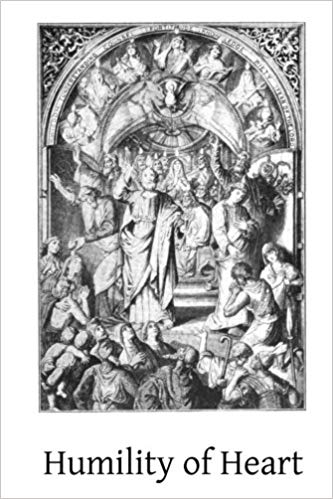
Humility of Heart
$4.95
To his own soul Cardinal Vaughan found so much benefit from the cultivation in it of Humility, that he resolved, at no small cost to himself, in the feeble state in which he then was, to gird himself and to go forth sowing broadcast, into the soil of the hearts of the laity as well as of clergy, this despised little mustard seed of which men speak so much but know so little. It was Padre Gaetano's work on Humility that had been the instrument, in God's hand, of helping the Cardinal. Accordingly in his zeal for souls he proposed to put it into English, so as to bring the work within the reach of all such as care for the health, growth and strength, of their own individual souls in solid virtue. That the Cardinal has left us a precious legacy in this treatise on Humility will, I feel sure, be the verdict of all who study, or who only peruse these pages, done into English from the Italian of the devout Minor Capuchin whose death occurred over two centuries ago. Between the covers of this unpretending volume there is nourishment for all who "hunger and thirst after justice"-----for the proficient in spiritual life as well as for the beginner-----Humility, as it were, holding in itself all those elements that are needed to build up the strong Christian man. In it the soul will find a sovereign remedy for its many ills, a matchless balm for its many wounds, while a soul-beauty all is own will spring up in all who shall learn how to use it wisely under the guidance of the Holy Spirit." He who is truly humble," says St. Bernard, "knows how to convert all his humiliations into humility," while out of humility God can raise a soul to what otherwise might be, giddy heights of sanctity. If anyone should need a proof of this statement I will refer him to any chapter in the life of any Saint in our Calendar. For a moment gaze into the face of "the Woman clothed with the Sun" and remember the words, "Respexit humilitatem ancillae suae." The height of Mary's sanctity is gauged by the depth of her humility: "Exaltavit humiles." To the Clergy and Ladies of Charity, to whom the Cardinal dedicates these "Thoughts and Sentiments," this volume will come with very special meaning. It enshrines the last words of a great Churchman, of a truly spiritual man, while it conveys a special message from the Cardinal's heart to all readers. This treatise is a sort of last will and testament of Cardinal Vaughan, bequeathed to those with whom he was most intimately associated in work for the good of souls. It is a legacy from one who made Humility a life-long study, and who had more opportunities than most of us know of making tremendous strides in it, through the humiliations which he welcomed as most precious opportunities offered him by God for the salvation and sanctification of his soul. May he rest in peace.
For More Good Traditional Catholic Books:


Sigrid Blencher's Egg Nog Bread

Ingredients
2 eggs, beaten
1 cup eggnog
2 teaspoons rum flavored extract
1 cup white sugar
1 teaspoon vanilla extract
1/2 cup butter, softened
2 1/4 cups all-purpose flour
2 teaspoons baking powder
1/2 teaspoon salt
1/4 teaspoon ground nutmeg
Directions
Preheat oven to 350 degrees F (175 degrees C). Grease bottom only of a 9x5-inch loaf pan, or three 3x5-inch loaf pans.
Blend together the eggs, eggnog, rum extract, sugar, vanilla and butter.
Sift together the flour, baking powder, salt and nutmeg. Add to eggnog mixture and stir just enough to moisten; pour into prepared pan or pans.
Bake large loaf for 40 to 60 minutes, or until a tester inserted in the center comes out clean. Breads baked in the smaller pans require 35 to 40 minutes. Cool for 10 minutes, and remove from pan. Cool completely, wrap tightly in plastic wrap or foil, and store in refrigerator.
Varn Lemming's Slow-Cooker Ham

Ingredients1 (6 pound) bone-in country ham
30 whole cloves
3 cups apple cider, or as needed
1 cup brown sugar
1 cup maple syrup
2 tablespoons ground cinnamon
1 tablespoon ground nutmeg
2 teaspoons ground ginger
2 tablespoons ground cloves
1 tablespoon vanilla extract (optional)
1 orange's peel
Directions
Press whole cloves into the ham so they are evenly distributed. You may score the ham for easier insertion if you wish. Place the ham in a slow cooker. Pour in apple cider until only about 2 inches of ham is above the surface. Pack the brown sugar on top of the ham, pressing into the cloves. This will get washed away in the next step but any that stays on is a bonus.
Pour the maple syrup over the ham. Season the apple cider with cinnamon, nutmeg, ginger, ground cloves and vanilla. Add the orange peel to the pot. Fill the slow cooker as full as you can with apple cider without going over the fill line. Cover and set to Low. Cook for 8 to 10 hours.

Video sermons and instructions: Timeless timely truths for living the Faith
Gaudete Sunday 2012
First Sunday of Advent 2014
Sacred Moments: Having Compassion, Making a Difference

Encouragement for Today
Therefore encourage one another and build one another up.... I Thessalonians 5:11
We believe...
that through our assorted podcasts, audio downloads and devotional blogs, you will find an assorted Treasure Chest of...
Sermons
Devotionals
Scripture Studies
Catechism Lessons
Daily Blogs
...that will be a help in your faithful walk with the Lord.
LEARN MORE AT THE ENCOURAGEMENT FOR TODAY WEBSITE: https://www.encouragementfortoday.com
Do Baby Stars Exist?

“The heavens declare the glory of God; and the firmament sheweth his handywork.”
Psalm 19:1
Big Bang Believers have an entire story about the life cycle of stars. It is a sophisticated story, as it has to encompass stars of many different types and lots of observed phenomena. However, its sophistication does not authenticate every element of it.
One of the consequences of this belief is the observation of so-called star nurseries. This leads to the claim that we can see stars forming in clouds of molecules or nebulae. After all, the model for star formation that Big Bang Believers use is that something disturbs the constituent parts of a molecular cloud so that molecules stick together in clumps. These clumps are said to act on each other by gravity, growing bigger and bigger, while the center gets hotter and hotter, until hydrogen atoms at the center begin to undergo nuclear fusion, and the star switches on!
It must be emphasized over and over again that this has not been observed to happen. Again, this has not been observed to happen. What is actually observed is the molecular cloud with small stars inside it, so the observation is assumed to be part of the story. One website suggested that the necessary disturbance could be caused by a comet passing through the nebula. But such a passage by a comet has not been observed.
God has certainly made an active universe in which there are changes that can be observed or inferred. But these things declare His glory, not random, deep-time chance.
Prayer: The more we discover about the universe, Lord God, the more we see Your glory. Amen.

Catechism Catch-Up
The Ten Commandments-Lesson 2
The Purpose of The Ten Commandments
The Ten Commandments Are A Reflection Of God’s Character And An Expression Of Who He Is.
We can know God by the ten commandments. If the law is a reflection of God’s character and humans are made in God’s image, then the law fits human nature as well as that of God. It follows that humans are structured to follow certain laws and operate in certain ways. For instance, a car that is not made for diesel fuel will not be able to run well on diesel. The car might stop altogether with water or sugar in the gas tank. Likewise, if one runs full speed into a brick wall, chances are that one will do more damage to himself than to the wall because the wall is stronger. If a person jumps from a plane, he may feel as free as a bird for a moment, but unless he has a parachute, the law of gravity will bring him crashing to the ground.
The second Purpose of the law is the pedagogical use of the law, in which the law is a Custodian.
Wherefore the law was our pedagogue (Custodian) in Christ, that we might be justified by faith. But after the faith is come, we are no longer under a pedagogue (Custodian). For you are all the children of God by faith, in Christ Jesus. (Galatians 3:24-26)
Jerome: A Custodian is given to infants to rein in an age full of passion and to restrain hearts prone to vice until the tender infancy is refined by growth...yet the custodian is not the Father,....The custodian guards another person's son and will depart from him when the lawful time of inheritance arrives.
Theodoret: Now it was necessary that the law be given, as it fulfilled our need of a custodian. And it freed us from our previous impiety, taught us knowledge of God and then brought us to Christ the Lord as though to some wise teacher, so that we might be instructed by him in perfect learning and acquire the righteousness that is through faith.
Chrysostom: Now if the Law was a custodian and we were confined under its direction, it was not opposed to grace but cooperated with it. But if it continues to bind us after after grace has come, then it is opposed to grace....Those who maintain their custody at this point are the ones who bring the child into the greatest disrepute. The custodian makes the child ridiculous when he keeps him close at hand even after the time has come for his departure.
The individual called in some translations "schoolmaster" was actually not headmaster or teacher, but rather a faithful slave whose duty it was to conduct his master's sons to and from school and prevent them from getting into mischief. Paul was comparing CHRIST with the real teacher, and the law was like the slave whose duty it was to conduct the pupil to the teacher.- Manners And Customs of Bible Lands: by Fred H. Wight, Copyright @ 1953
The Ten Commandments Exposes the Nature of Man
Since the Fall of Adam and Eve every person is born into this condition of sin "For I know my iniquity, and my sin is always before me" (Psalm 51:5) "For as by the disobedience of one man, many were made sinners; so also by the obedience of one, many shall be made just." (Romans 5:19). God gave us His law to reveal not only His holiness, but our sinfulness.
“Now the law entered in, that sin might abound. And where sin abounded, grace did more abound." (Romans 5:20) In other words, God’s law was given so that all people could see how sinful they were.
Through the law we are reminded and convicted of how far we have fallen from an relationship with God and the impassable chasm that exists between us.
“Whosoever committeth sin committeth also iniquity; and sin is iniquity (Lawlessness)." The person who sins breaks God’s law. Sin is living against God’s law. (I John 3:4)
“What shall we say, then? Is the law sin? God forbid. But I do not know sin, but by the law; for I had not known concupiscence, if the law did not say: Thou shalt not covet. But sin taking occasion by the commandment, wrought in me all manner of concupiscence. For without the law sin was dead. And I lived some time without the law. But when the commandment came, sin revived, And I died. And the commandment that was ordained to life, the same was found to be unto death to me. For sin, taking occasion by the commandment, seduced me, and by it killed me. Wherefore the law indeed is holy, and the commandment holy, and just, and good. Was that then which is good, made death unto me? God forbid. But sin, that it may appear sin, by that which is good, wrought death in me; that sin, by the commandment, might become sinful above measure.” (Romans 7:7-13)
A person can be told he has dirt on his face. The person will go to a mirror to take a look. The mirror accurately reflects a true image. The dirt is indeed there. The person might walk away from the mirror, but his “dirty face” condition remains. Washing the mirror or taking it away does not clean the face. God’s law is like a mirror. When gazed into it shows man’s true condition. Ignoring or rejecting the law does not take away our condition of sin. When facing the standard of God’s holy law we realize there is not one of us who has not sinned. All have sinned and fallen short of God’s standard.
“As it is written: There is not any man just. There is none that understandeth, there is none that seeketh after God. All have turned out of the way; they are become unprofitable together: there is none that doth good, there is not so much as one.” (Romans 3:10-12)
“Now we know, that what things soever the law speaketh, it speaketh to them that are in the law; that every mouth may be stopped, and all the world may be made subject to God. Because by the works of the law no flesh shall be justified before him. For by the law is the knowledge of sin....For all have sinned, and do need the glory of God…” (Romans 3:19-20; 23)
Let’s say that a chain represented our lifeline to God. It was the means by which we could reach Him. The way by which we could restore the position once lost. And each link in the chain represented a law of God.
We would need to keep each law perfectly in order to be reconciled with God. In fact we would have to be born in this perfect condition. Only two people were born in this perfect condition. And that was Jesus who was the Son of God, and the Virgin Mary, born full of the grace of God from conception.
Let's say a person were only to break one of the ten commandment once in his life? That would be a pretty righteous person. But are they good enough for God’s requirements?
If a person were hanging by a chain and one link broke, they would fall. It doesn’t take breaking every link to fall from God – just one!
“And whosoever shall keep the whole law, but offend in one point, is become guilty of all.” (James 2:10)
Who is God? He is a Holy God. Who is man? He is A Sinner. Sin has alienated mankind from God. It has made the whole human race at enmity with Him. We selfishly seek after those things that fulfill our depraved passions. We lift ourselves to be our own gods, running our own lives, controlling our own destinies. Humankind is bent toward evil as a tree bends to the light. Human nature is to operate in contradiction to the law of God! Why? Because we are born sinners.
As if this were not bad enough…there’s more! Not only have we been separated from God because of sin, but this separation brings with it consequences.
When we go to work at a job we receive wages (pay) for the work we did. It is inevitable – that is why we are employed.
In life, wherever there is a work of sin, there is an accompanying wage (payment) for the sin worked or committed. It is called the wage of death. When man works sin he receives death.
“For the wages of sin is death…” (Romans 6:23)
“The soul that sinneth, the same shall die” (Ezekiel 18:20)
“Wherefore as by one man sin entered into this world, and by sin death; and so death passed upon all men, in whom all have sinned. For until the law sin was in the world; but sin was not imputed, when the law was not. But death reigned from Adam unto Moses, even over them also who have not sinned after the similitude of the transgression of Adam, who is a figure of him who was to come.” (Romans 5:12-14)
When Adam sinned, sin entered the entire human race. Adam’s sin brought death, so death spread to everyone, for everyone sinned. Yes, people sinned even before the law was given. And though there was no law to break, since it had not yet been given, they all died anyway—even though they did not disobey an explicit commandment of God, as Adam did.
God is life. When separated from him there is inevitable death. Like a grape on a vine. When the grape is cut from its source of life, it dies.
When Adam sinned there was immediate death and alienation from the life that is within God. Sin also brought physical death. A dead person does not respond to sights, sounds, or touch. In the same way, the spiritually dead are unable to see, hear, or touch Him. The fact of our death in sin explains our helplessness. Without life there is hopelessness and despair.
We were created eternal beings (this is part of being in the likeness of God). He created us to enjoy fellowship with Him forever. When sin entered, our physical bodies would perish, but our spirit would live forever. For those who have sinned (all of mankind) separation from God is for eternity. This means suffering eternal death in a place God created for Satan and his angels called Hell. It is a place of torment and fire. Though there will be “weeping and gnashing of teeth” the worst part is being banished from God for all eternity with no hope of ever getting out. Does this make God unreasonable? Does it make Him merciless and unrelenting? Not at all! God in His holiness can not abide sin in man. It’s like trying to mix light and darkness, or good and evil.
Left to himself, mankind’s condition of sin leaves him helpless, destitute, alone, hopeless, and separated from God.
But remember, after Adam and Eve sinned, God promised he would provide an answer to this devastating separation of man from Himself. And that answer was Jesus Christ and what did he did on the cross for us. So what is our part?
I. Realize You're a Sinner:
As we said, one of the reasons the Ten commandments were given to us, is to show how sinful we really are.
II. Believe on Jesus as the one who bore your sin, died in your place, was buried, and whom God resurrected.
"But as many as received him, he gave them power to be made the sons of God, to them
that believe in his name." (John 1:12)
III. Repent
Repentance is to have such a sorrow for something, that it makes you want to change
your mind and your actions toward that thing.
"Be penitent, (repent) therefore, and be converted (turn back or change your mind),
that your sins may be blotted out." (Acts 3:19)
IV. You must desire and seek to be baptized.
"Do penance, and be baptized every one of you in the name of Jesus Christ, for the remission of your sins: and you shall receive the gift of the Holy Ghost." (Acts 2:38)
V. If you will do these four things and truly mean it then this is what God will do.
And I will give you a new heart, and put a new spirit within you: and I will take away the stony heart out of your flesh, and will give you a heart of flesh. And I will put my spirit in the midst of you: and I will cause you to walk in my commandments, and to keep my judgments, and do them. (Ezekiel 36:26-27)
In the next 10 lessons, we will discuss each of the ten commandments and what they mean. But beware, the more you learn the commandments of God, the more you are held accountable for in eternity. So please prepare for your eternity by fully committing your life to Christ so that he can give you a new heart and so that he can "put His spirit in you"and give you the power of that spirit at your confirmation so that you may be able "to walk in His commandments, and keep His judgments, and do them".
Living Catholic:
Can God Soften A Heart Hardened By Disappointment And Rebellion?
From Rebellion to Freedom in Christ
A young woman’s testimony of God’s transforming grace
Even though both of my parents are believers in Jesus Christ and sought to raise my siblings and me in a way that honored God, my life was headed for destruction from an early start.
A Death and Disillusionment
When I was 4 years old, my parents were expecting their fourth child. My dad worked ten-hour days and rarely had time for the family. My mom was also very busy with three young children and a fourth one on the way. My parents were busy, and I often got into trouble, but I was excited about the coming of a new baby. If it was a girl, I thought she and I would be best friends—unlike my relationship with my younger sister Sarah, with whom I often quarreled.
When my mom had an ultrasound, we found out that the baby was a girl but that she would not live. She had anencephaly, a brain deformity that prevented the top half of her brain from developing. When my mom went into labor, the birth process would end the baby’s life.
I was heartbroken, but having been taught that God answers prayer, I dutifully prayed every night and every morning for the next five months that my sister would live. Seven weeks before her due date, my mom’s labor was induced at the hospital to prevent uterine rupture from excessive amniotic fluid. The baby was stillborn.
When I went to the hospital to see her, I remember telling myself that if God would not answer my prayers, He did not love me and that I did not need Him or anyone else. From then on, I believed the lie that I had to take care of myself in the world. I started on the long road toward self-dependency and spent the next eleven years battling against my need for others and for God.
Locked Up in Rebellion
I became what one might call a silent rebel—silent for awhile at least. My parents home schooled, and when I was old enough I attended some Seminars. Yet, I was not dissuaded from my doubts and bitterness.
The adults at the parish we went to were oblivious to the state of my heart, but the kids knew everything. I had lots of friends, but I hung out with the wrong crowd. My morals were set by my peers’ morals, and the person I admired most was also in rebellion. I was so controlled by the actions of those I looked up to that I stopped doing things like participating at the Mass and focusing on the prayers—simply because my friends weren’t doing it.
By the age of 13 or 14, I was completely locked up emotionally. I refused to cry about anything. The effects of my sin, the grief I brought my parents, and my stubborn will did not soften my emotions at all. I thought crying was a sign of weakness rather than humility, and the only time I gave in to selfish tears was when I was completely alone.
I began having a horrific nightmare—the same dream every night. I ground my teeth until my jaws ached so much that I had to take a large dose of Advil to cover the pain. I was in deep depression and I was truly suicidal.
Going on a Journey
When my parents first proposed sending me on a discipleship retreat, I refused to go. After a month or two, my parents contacted the staff of the discipleship retreat and gained permission for me to attend. My mom packed my bags, signed my papers, and walked me to the plane. I was not pleased! I told my parents that I would not change and that not even God could change me. I no longer believed in God’s existence.
When I go off the plane at the airport, the spiritual director chosen for me knew right away that something was going on inside of me. Although I had successfully concealed the true condition of my heart from hundreds of adults over the years, she saw right through me.
On the way to the retreat house, our van blew a tire. We were hauling a luggage trailer as well, and I knew that fifteen-passenger vans don’t just keep driving in a straight line when they have a tire blowout big enough to burst the antifreeze line! God saved our lives that day and kept the van from swerving off the four-lane highway. I am convinced He did it to show me that He is real and to preserve the lives of all the young ladies in the van with me.
A Turning Point
I spent the first four days of the retreat in resistance, but God got a hold of my heart on Thursday night. I stuck my head into my sister’s room and found that she and her friend were praying for me. Then our group watched a film about the love God has for me. Although I had not cried for as long as I could remember, I was overwhelmed with the idea presented in the film—that someone loved me. Because I had shut out my family’s love, it was a new thing to know that I was loved, and it was a new thing to realize that I needed someone to love me.
I felt my heart being ripped into shreds. However, I was determined not to give in. I had encountered similar things in the past, which I had resisted, and I was not planning on giving in this time. I strained every muscle in my jaw and face to keep from bursting into tears. As I sat there with my jaws clenched shut and my eyes closed so tight that they ached, I wondered if I’d actually make it through this experience unscathed.
At that moment, my roommate leaned over and started praying for me. As soon as I felt her hand on my shoulder, I couldn’t stop crying. Her prayer was beautiful, and although I don’t remember all the words, I do remember that it came from a heart that desperately wanted me to experience lasting freedom from sin.
I surrendered to God that night. I chose not to hold back the one thing I had vowed never to give up. The moment I released it, I felt like a ton of baggage was lifted off my back. I will never be able to accurately describe how much lighter I felt after that night! I was freer than I had ever been in my life. God began a change in my life. I repented of my sin and laid my life before the feet Jesus to do with as He willed.
Hoping in God’s Faithfulness for the Future
Looking back, I see how much God has done in my life. Once I had repented of my sin and surrendered my life to Christ, I was baptized, I went to confession, was able to participate in Holy Communion and then I was confirmed. God has changed my heart and my attitude through the graces I have received through the sacraments. But I also understand that this life in Christ is not over. I have a longways to go in becoming like Christ and living in His truth. It’s a very long way, but I know God is faithful. And through much prayer, reading God's written word meditating on Him day and night, allowing his graces to flow through me, I will become that much closer to being more like Him.
In the last two years, I’ve learned that true freedom is actually found in being a bond slave of the Lord Jesus Christ. There is no real freedom if you are “free” by the world’s definition (to live without restraint). It brings only fear and turmoil, and sometimes temporary happiness that leads to disillusionment when it fades away.
As God continues the work He began in me, I look forward to seeing how much more He will do with my life as He makes me more like Christ. “But as for me, I will appear before thy sight in justice: I shall be satisfied when thy glory shall appear.” (Psalm 17:15)
To Learn More Principles For Life Go To: Resources: Principles of Life

Pray for the Holy Father! Pray with the Holy Father!
-
Your prayers are asked this month and every month for the intentions of the Holy Father, Pope Michael.
- Pray for the physical needs of the missionary work of the Church! One of our vehicles needs new tires to stay on the roads and to help us do the work of the Church! (Consider making a Donation to help, if you can!)
-
Keep us in your prayers as we begin our new Podcast Ministry, a new way to reach out in the missionary work of the Church! We ask for prayers for our other activities world wide. We have made good contacts in the Philippines and Japan and ask prayers that these contacts will bear much fruit for the salvation of souls.
-
Be sure to keep St. Helen Catholic Mission in your prayers. Why not go on over to the site now and see what they have to offer and how you might be able to help!
-
Also we ask you to keep in prayer our Mission: St. Ignatius of Antioch in Arkansas City, Kansas.
-
Your prayers are asked for Father Francis Dominic as he embarks upon the important work entrusted to him within the Church.
-
Pray for those outside the Church and those who do not know God, that they may see the light of grace and be led safely home to the refuge of the Holy Catholic Church.
-
As always, we also ask that you pray for yourself! Never forget your own state of soul. God is calling you to His service in His love. We know that our Lord can count on you to answer.
-
We are all praying especially for you, too. May you correspond with every grace of God!
-
In what other needs or intentions may we pray for you? Let us know!
-
Let us remember that the Church runs on prayer. Without your prayers, God will not work in hearts and souls to bring them to a knowledge of the truth. (I Timothy 2:4)



To Donate by Mail:
Our address is
Vatican in Exile
829 NE Chester
Topeka, Kansas 66616
Make Checks payable to:
Vatican in Exile

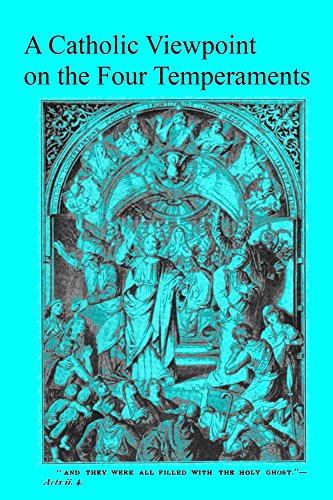










 Follow
Follow


